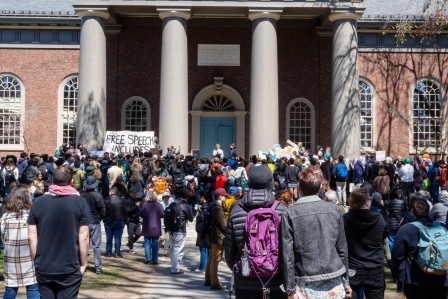The landscape for Harvard international students has shifted dramatically, with recent developments sending shockwaves through the academic community. Just today, May 22, 2025, the Trump administration revoked Harvard University’s ability to enroll foreign students, a move that has left thousands of current and prospective students scrambling. This decision, driven by the Department of Homeland Security (DHS), marks a significant escalation in an ongoing clash between the federal government and one of America’s most prestigious institutions. For Harvard international students, this isn’t just a policy change—it’s a life-altering disruption that threatens their academic dreams and legal status in the U.S.
The Latest Blow to Harvard International Students
The DHS, led by Secretary Kristi Noem, announced the immediate revocation of Harvard’s Student and Exchange Visitor Program (SEVP) certification. This program allows universities to sponsor visas for international students. Without it, Harvard can no longer admit new foreign students, and existing ones must transfer to other institutions or risk losing their legal status. The administration cites Harvard’s alleged failure to comply with demands for detailed records on foreign students’ disciplinary histories and protest activities as the reason for this drastic step. Noem called it a “privilege, not a right” for universities to host international students, framing the move as a crackdown on antisemitism and non-compliance.
Harvard, home to over 6,700 international students—roughly a quarter of its student body—now faces a crisis. Students from more than 140 countries enrich the campus with diverse perspectives, but this diversity is at risk. The university has labeled the action “unlawful” and vowed to fight it, emphasizing the immense contributions of its global scholars. For many students, the uncertainty is palpable. Imagine preparing for a semester at Harvard, only to learn you might need to uproot your life overnight.
A Timeline of Tensions for Harvard International Students
The road to this moment has been fraught. Let’s break it down:
- April 2025: DHS demanded Harvard provide records on foreign students’ protest involvement and disciplinary actions, threatening SEVP revocation if unmet by April 30.
- Early May 2025: Harvard partially complied, sharing some data but withholding specifics, citing privacy concerns. The university also adjusted its admissions policy, allowing international students to secure “backup” acceptances at foreign institutions.
- May 22, 2025: After weeks of back-and-forth, DHS followed through, stripping Harvard’s SEVP certification. Current students now face a transfer mandate, while prospective ones are barred from enrolling.
This timeline reflects a broader campaign against Harvard, including frozen federal grants and threats to its tax-exempt status. The administration’s focus on alleged “pro-terrorist” protests and antisemitism has put Harvard in the crosshairs, with international students caught in the middle.
The Human Impact on Harvard’s Global Community
Picture a sophomore from Vienna or a graduate student from Pakistan, both thriving at Harvard, now facing the prospect of leaving the U.S. The revocation doesn’t just affect logistics; it disrupts lives. Students like Karl Molden, a Harvard sophomore, expressed unease even after earlier visa restorations, sensing the temporary nature of such reprieves. Others, like those who rallied in April against DHS demands, fear retaliation for activism. The campus mood is one of defiance mixed with anxiety, as students and faculty grapple with a “changed” Harvard where the “best and brightest” feel unwelcome.
Harvard’s response has been swift but measured. The university is exploring legal avenues to restore its SEVP status and is providing guidance to affected students. Yet, the clock is ticking. For those on F-1 or J-1 visas, transferring to another U.S. institution is the only path to maintaining legal status, a process fraught with logistical and emotional hurdles. The stakes are high, not just for students but for Harvard’s global reputation.
What’s Next for Harvard University’s International Scholars?
The future remains uncertain. Harvard could regain its SEVP certification by fully complying with DHS demands within a tight 72-hour window, but this would mean handing over sensitive student records—a move the university has resisted. Meanwhile, students are left navigating a maze of visa regulations and transfer applications. The broader implications are chilling: if Harvard, with its $53 billion endowment, can’t withstand this pressure, what does it mean for other universities?
For now, the Harvard community is rallying. Faculty like Cornell William Brooks have praised students for their unity, while student leaders urge resilience. The fight isn’t over, but the path forward is steep. Harvard international students, once symbols of global academic excellence, now stand at a crossroads, their futures hanging in the balance.
Stay informed and support Harvard’s international students by following updates from the university’s official channels and sharing their stories. Your voice can amplify their fight for academic freedom and opportunity.
